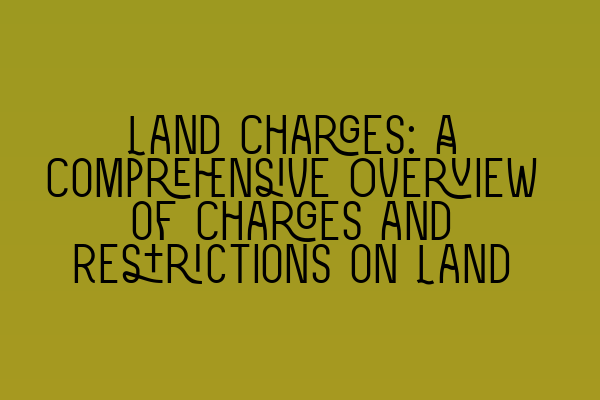Land Charges: A Comprehensive Overview of Charges and Restrictions on Land
When it comes to property law, understanding land charges is essential. Whether you are buying a property, selling one, or involved in any other type of property transaction, it is crucial to be aware of any charges or restrictions that may affect the land in question. In this comprehensive guide, we will delve into the world of land charges, explaining what they are, why they exist, and how they can impact property ownership.
What are Land Charges?
Land charges refer to any legal interests or claims that are registered against a property. These charges are usually registered with the Land Charges Registry, an important part of the UK’s land registration system. The intention behind registering land charges is to provide transparency and ensure that anyone dealing with the property has all the necessary information about its potential encumbrances.
Land charges can include various types of restrictions, such as easements, restrictive covenants, and other legal rights. These charges can significantly affect the way the property can be used or developed, and failing to consider them can lead to costly disputes or complications in the future.
Types of Land Charges
There are several different types of land charges that can be registered against a property. Let’s explore some of the most common ones:
1. Easements
Easements are rights over the land that benefit another person or property. They grant specific rights of use or access to a neighbouring property, such as a right of way, drainage or utility easements. Easements can be created through explicit agreements or acquired through long-term use.
If you are buying a property, it is essential to be aware of any easements that may exist, as they can impact your ability to use or develop the land as desired. A professional property solicitor can help you identify and understand any easements associated with the property you are interested in.
2. Restrictive Covenants
Restrictive covenants are legal obligations that restrict the use or development of land. They are often included in the deeds of a property and can dictate what can and cannot be done on the land. For example, there may be restrictions on the type of building that can be erected or limits on certain activities, such as running a business from the property.
It is crucial to carefully review any restrictive covenants associated with a property before purchasing it. Failure to comply with these covenants can result in legal action and costly consequences. Consulting with a property law expert can help you understand the implications of any restrictive covenant you encounter.
3. Charges by Way of Legal Mortgage
Charges by way of legal mortgage are common when properties are purchased with a mortgage loan. This charge gives the lender a legal interest in the property as security for the loan amount. If the borrower defaults on the mortgage payments, the lender has the right to repossess and sell the property to recoup the outstanding debt.
It is crucial for buyers to be aware of any charges by way of legal mortgage when considering purchasing a property. Additionally, if you are considering taking out a mortgage on your own property, understanding the implications and legal obligations associated with this charge is vital. Engaging a property solicitor can assist you in comprehending the details and possible consequences of a legal mortgage.
Registering and Searching Land Charges
Now that we have explored some of the common types of land charges, let’s dive into how they are registered and searched. The Land Charges Registry offers a search service, allowing interested parties to access information about any registered charges or restrictions on a particular property.
When purchasing a property, conducting a thorough land charges search is crucial to identify and understand any potential issues. The search will provide information on ownership, existing charges, and other relevant details. This information is essential for making informed decisions and mitigating any risks associated with the property purchase.
Professional property solicitors have expertise in conducting comprehensive land charges searches and can ensure that you are fully aware of the legal encumbrances associated with a property.
Conclusion
Understanding land charges is imperative in property law. Whether you are buying, selling, or involved in any property transaction, being aware of the charges and restrictions on land can help you avoid complications and make informed decisions. From easements to restrictive covenants and charges by way of legal mortgage, each type of land charge can have significant implications, affecting the use and development of the property.
If you are considering a property purchase or require assistance with any property law matters, it is highly recommended to seek professional advice from a qualified property solicitor. They can guide you through the intricacies of land charges, ensuring a smooth and legally sound property transaction.
For further resources on property law, preparing for SQE exams, or finding information on upcoming exam dates, please visit the following articles:
